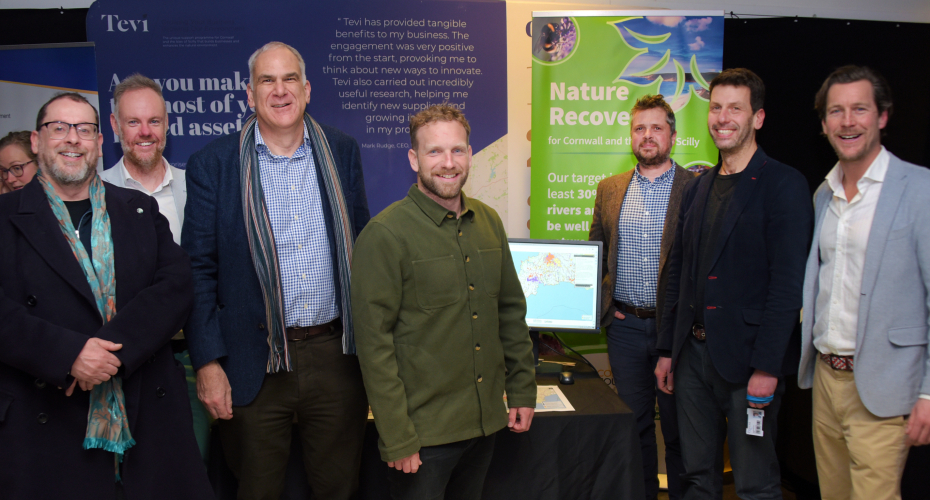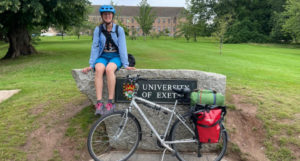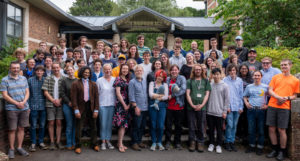University-led projects leave legacy for Cornwall’s business community

A series of University of Exeter-led projects celebrated the lasting impact they have made on businesses and communities in Cornwall on Thursday 9th March.
Since 2014, the University of Exeter’s projects have supported over 900 businesses in the region by providing access to grants, business development resources, and funding for innovative technologies.
This support enabled the delivery of the world’s first energy independent farm in Saltash, drove rapid innovations in Cornwall’s marine technology and renewable energy sectors, and helped hundreds of businesses to reduce their waste and adopt carbon-neutral business models.
Chris Evans, Director of Innovation, Impact and Business at the University of Exeter, said: “The impact these projects have made on Cornwall’s economy, community, and innovation ecosystem shows what is possible when universities and businesses work together in partnership. I would like to congratulate our project teams – and the many partners and businesses they have worked with over the past few years – for their impressive achievements.”
The projects also created close partnerships between Cornwall’s business and university communities that have laid the foundations for future collaboration and problem-solving.
Mark Duddridge, Chair of the Cornwall and Isles of Scilly Local Enterprise Partnership, said: “Investment from the EU has supported the regeneration of our economy and, through these projects and the partnerships they have created, left a lasting legacy that will underpin future investments in Cornwall.”
Kim Conchie, CEO of Cornwall Chamber of Commerce, said: “The close relationships that local businesses now have with the University of Exeter and Falmouth University have made such an incredible impact on Cornwall’s workforce, business confidence and future prospects. That legacy will continue long into the future.”
Marine Innovation
The Marine-i programme has driven forward marine technology in Cornwall, overseeing £13.4m investment, funding 85 marine projects and supporting 197 businesses with research and development.
Among them is Angela Mead, Founder and Managing Director of Biome Algae, who received Marine-i support to scale-up her company, which specialises in farming and processing seaweed for use as a plastic substitute. She said: “When we first joined the Marine-i programme, we were definitely a small SME – but we had an ambitious idea. To be able to de-risk what could have been an expensive and challenging project was invaluable.”
Her company went on to win Green Start Up of the Year 2022 for South West England.
Circular Economy
The Tevi initiative helped over 300 SMEs across Cornwall to become more resource-efficient and minimise waste, through a mixture of consultancy support, masterclasses, and grant funding.
One such company is Bennamann, who helped to create the first energy independent farm in Saltash. Their technology captures harmful methane emissions from manure slurry and converts them into biomethane, thereby reducing farmers’ energy and fertiliser bills. Speaking at the event, Bennamann’s CEO Dr Chris Mann, said: “this technology will deliver huge impact to Cornwall by reducing harmful methane gases and providing farmers with a future clean energy source.”
Tackling the same theme, the Arca programme reached over 200 businesses with circular economy workshops that have helped employees and business owners build skills to eliminate waste and maximise the efficient and sustainable use of resources. Julian Mills, Founding Director of STUDIO/gather Sustainable Architecture, said his team “came away totally buzzing to hear the stories and journeys told by other local businesses.”
Health and Wellbeing
The six-year Smartline project explored how digital technologies can support local residents’ health and wellbeing by improving housing and social connections, delivered in partnership with Coastline Housing Association, Cornwall Council, Volunteer Cornwall and the University of Exeter.
The Inclusivity Project worked with businesses in Cornwall and the Isles of Scilly, such as Software Cornwall and Cornwall Museums Partnership, to understand and addresses the challenges that employers have towards creating inclusive workplaces for people who are 50+, who are disabled, and/or have a long-term health condition.
The projects were supported by funding from European Structural and Investment Funds (ESIF), alongside match-funding from the University of Exeter. The ESIF programme was designed to help support employment-related projects and create a sustainable and healthy economy by investing in research and development, digital technologies, sustainable practices, and small businesses.
The full list of projects involving the University of Exeter includes: Tevi, Marine-i, Smartline, Immersive Business, Met4Tech, Arca, Future Focus, Deep Digital Cornwall, The Inclusivity Project, and Cornwall Floating Offshore Wind (FLOW) Accelerator.



